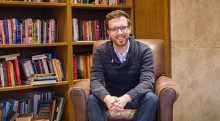Spencer McMurray is a born peacemaker. First as an intermediary in his large family and later as a peer mediator in elementary and high school, McMurray has always had a knack for resolving conflict. Now a fourth-year Peace, Conflict and Justice (PCJ) student at the Munk School of Global Affairs, McMurray tells us what inspired him to take his passion for peacebuilding global.
Describe your big “a-ha” moment.
I have always been somewhat of a peacemaker because I came from a large, boisterous household. I was the middle child who acted as a bridge between my parents and my brothers and sisters. Even in elementary and high school, I would help my peers resolve schoolyard disagreements. I’ve always listened and assisted — that was just what came natural to me.
At one point, I considered becoming a family therapist or getting into a field that resolved issues within families or communities. But then I interned at a joint Israel-Palestinian peacebuilding radio station in East Jerusalem. There, I produced and hosted a program called “The Way I See It”, which was a foreigner’s take on the Israeli-Palestinian conflict. I became really interested in the concept of peace, specifically peacebuilding and conflict resolution through dialogue. It was after my time in East Jerusalem that I decided to shift my focus from family therapy to international conflict resolution.
What’s a global issue you’re passionate about and why?
I’m interested in understanding the ways in which Western development or peace-making actors impact or perpetuate, conflict, especially when it comes to the politics of peace agreements. While interning in East Jerusalem I became more aware of the international community’s role in the Israeli-Palestinian conflict, for instance, brokering the Oslo Accords and developing initiatives to reinforce them. I noticed that the Accords seemed to make life better for those in Jerusalem but they did little to address the foundations of the conflict. I started to question whether we in the West really help to diffuse tension and deliver aid, or are we perpetuating conflict? I want to discover whether there are better ways to negotiate peace agreements, deliver aid and promote development for those in the midst of conflict.
Who has influenced you the most in life and why?
Without the PCJ program, I wouldn’t have understood the determinants of conflict, which is key to resolving them. The Munk School has given me the tools to really challenge myself academically and prepare myself to do work in the area I’m most passionate about, which is conflict resolution. The program is fantastic...I can’t stress that enough!
What impact do you want to have on the world or your local community?
I want to become a peace and development advisor or a conflict negotiator, helping to resolve conflict through brokering cease-fires or negotiating peace agreements. I want to make informed and comprehensive peace agreements that include as many actors as possible: not just elite political groups, but businesses and the local community. Everyone should have a say in the way that these peace agreements are formed. I believe that such agreements can establish hospitable parameters for development and post-conflict political reconstruction.
Tell us your personal philosophy.
Dialogue and understanding can lead to a post-conflict society.
January 23, 2017
